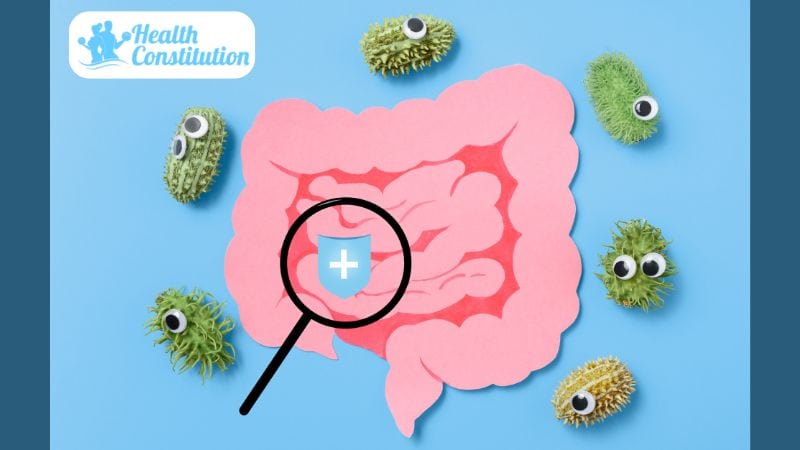Despite their similar-sounding names, prebiotics and probiotics serve distinct yet complementary roles in maintaining digestive health. Understanding their differences and relationships is key to optimising gut health and overall well-being.
Disclaimer: This article provides a simplified explanation of complex concepts in layman’s terms. For more detailed and in-depth information, please conduct your research and consult with medical professionals. Caution: Always consult your healthcare provider before adding supplements to your diet.
Let’s get started with what probiotics are before moving on to prebiotics.
What are Probiotics?
Probiotics are live beneficial microorganisms that support the natural bacterial balance of your body. These “good bacteria” primarily reside in the gut, assisting with food digestion, nutrient absorption, and immune system support.
See What is the Gut-Brain Connection? to learn more about the importance of maintaining a balanced gut microbiome.
Fermented foods are the most common sources of probiotics. According to Katherine Zeratsky, R.D., L.D. (2022), natural probiotic-rich foods include:
- Yogurt with live cultures
- Sauerkraut
- Kimchi
- Kombucha
- Kefir
- Traditional fermented buttermilk
- Tempeh
- Miso
Now that we have a brief idea of probiotics, let’s move on to prebiotics in the next section.
What are Prebiotics?
Prebiotics are specialised dietary fibres that act as food for probiotic bacteria. While our bodies cannot digest these fibres, they serve as crucial nutrition for the beneficial bacteria in our gut, helping them thrive and multiply.
Natural Prebiotic Sources
According to Inner Health, prebiotics are present in these foods:
- Whole grains
- Bananas
- Onions
- Garlic
- Asparagus
- Jerusalem artichokes
- Honey
- Legumes
- Berries

In the following section, we’ll learn about the relationship between prebiotics and probiotics.
The Synergistic Relationship and Benefits
Rather than competing, prebiotics and probiotics work together in a symbiotic relationship. Probiotics add beneficial bacteria to the digestive system, while prebiotics provide the necessary nutrition for these bacteria to flourish.
This partnership helps maintain a balanced gut microbiome, which is essential for various aspects of health.
Health Benefits
The table below lists some of the health benefits of probiotics and prebiotics.
| Probiotic Benefits | Prebiotic Benefits |
|---|---|
| Improved digestive health | Regulate blood sugar levels |
| Reduced risk of antibiotic-related diarrhoea | Support for probiotic bacteria growth |
| Enhanced immune function | Better digestive health |
| Potential improvement in mental health conditions | Aid calcium absorption |
| Better nutrient absorption |
While taking supplements has benefits, there can be side effects, too. We will visit this in the next section.
Supplementation Safety and Side Effects
While prebiotics and probiotics are available as supplements, most healthy individuals can obtain adequate amounts through a balanced diet.
As a precaution, one should always check with their doctors for advice before taking any supplements, as everyone’s body is unique and may react differently.
Individuals with compromised immune systems or certain medical conditions, in particular, should be vigilant and exercise caution. Some people may also experience temporary digestive symptoms initially when increasing their intake of these substances.
How to Incorporate Prebiotics and Probiotics into Your Diet
The most effective approach to incorporating prebiotics and probiotics into your diet is through natural food sources. A diet rich in diverse plant foods naturally provides prebiotics, while including fermented foods ensures a regular supply of probiotics.
Here’s how you can easily incorporate prebiotics and probiotics into your diet:
- Start your day with probiotic-rich yogurt topped with prebiotic-containing bananas
- Include fermented vegetables like kimchi or sauerkraut with meals
- Incorporate whole grains and legumes into your lunch or dinner
- Add garlic and onions to cooking for prebiotic benefits
- Consider kombucha as a probiotic beverage option
Bottom Line
The relationship between prebiotics and probiotics demonstrates the complexity and interconnectedness of digestive health. While each plays a unique role, their combined effect offers the most significant benefits for gut health and overall wellness. Focus on incorporating both through a varied, nutrient-rich diet rather than relying solely on supplements.
- Who Should (and Shouldn’t) Take Probiotics? - 16 November 2024
- How to Choose the Right Probiotic - 16 November 2024
- Prebiotics vs Probiotics: The Dynamic Duo of Gut Health - 16 November 2024
